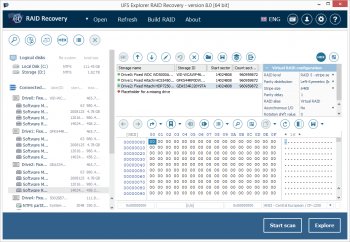File Details |
|
| File Size | 18.6 MB |
|---|---|
| License | Shareware, $139.95 |
| Operating System | Windows (All) |
| Date Added | August 21, 2024 |
| Total Downloads | 7 |
| Publisher | SysDev Laboratories LLC |
| Homepage | UFS Explorer |
Publisher's Description
UFS Explorer Professional Recovery is an expert-level software instrument created to address highly complicated data recovery challenges.
Along with linear electronic media, like hard disks, thumb drives and memory cards, the program handles RAID-based storages with various layouts, including standard, nested, custom and specific configurations - Drobo BeyondRAID, Synology Hybrid RAID, Btrfs-RAID and ZFS RAID-Z. The integrated decryption algorithms make it possible to open volumes encrypted with BitLocker, LUKS, FileVault 2 and APFS without having to unlock them in the operating system. The software also supports numerous file systems used in Windows, Linux, macOS and BSD, offering direct access to their content, well as a variety of storage technologies, among which are Windows Dynamic Disks, Storage Spaces and deduplication, Apple Software RAID, Core Storage and Time Machine, Linux mdadm and LVM with Thin Provisioning. Furthermore, the application allows working with various virtualization systems, like VMware, Hyper-V, VirtualBox, QEMU, XEN and many formats of disk images.
Moreover, UFS Explorer Professional Recovery features extended possibilities for efficient processing of storage devices, especially ones that demonstrate certain hardware problems. The software offers an advanced procedure for opening storages with parameters as to their usage and an opportunity to save a sparse image file with the processed data. Operations with drives connected to DeepSpar Disk Imager can be performed via LAN and controlled by the software without the need for any third-party solutions. A full or partial image of a disk can also be created with the help of an embedded imaging function with various settings for disk reading and omission of damaged blocks. A map with defective areas can be generated during imaging or through the conversion of used/free file system space to mask and employed during the recovery procedure. The raw content of files and storages can be analyzed and edited directly in the software with a broad set of supplementary tools.
UFS Explorer RAID Recovery is an accomplished software product geared towards RAID-related data recovery cases, besides usual simple tasks. The program allows reconstructing RAID systems of various configurations, including standard, nested or custom RAID patterns, and effectively restores data lost due to various logical issues, while a set of helpful options like file sorting, search, filters, preview, indication of a state, etc. make the process easy and smooth. The software supports a wide range of file systems used in Windows (NTFS, FAT, FAT32, exFAT), macOS (HFS+, APFS), Linux (Ext2, Ext3, Ext4, XFS, JFS, ReiserFS, UFS/UFS2, Btrfs), BSD/Solaris (ZFS) and is capable of working with various modern storage technologies, like mdadm, LVM, LDM, MS Storage Spaces, Drobo BeyondRAID, Synology Hybrid RAID, Btrfs-RAID, Apple Software RAID, Apple Fusion Drive, BitLocker and APFS encryption. The utility makes it possible to build RAID in a virtual mode, edit RAID parameters or save them for further work. Also, the software features an embedded hexadecimal viewer for brief analysis of data on partitions and disks. Furthermore, the program provides an extensive set of instruments for work with damaged drives. It allows defining settings related to access and usage of a storage device, creating a full or partial disk image with configurable parameters and rules for the omission of bad blocks. Drives and arrays with bad blocks can be processed using bad sector maps generated during imaging, through recognition of a given pattern or created by other compatible tools. In addition to RAID and RAID-based devices, like NAS, the software is applicable for data recovery from other storages: PCs and laptops, USB flash drives, memory cards, external hard drives, virtual machines, disk image files, etc. Among the supported virtual technologies are VMware, Hyper-V, VirtualBox, QEMU, XEN, Parallels, disk images of Apple, EnCase, R-Studio and other formats.
